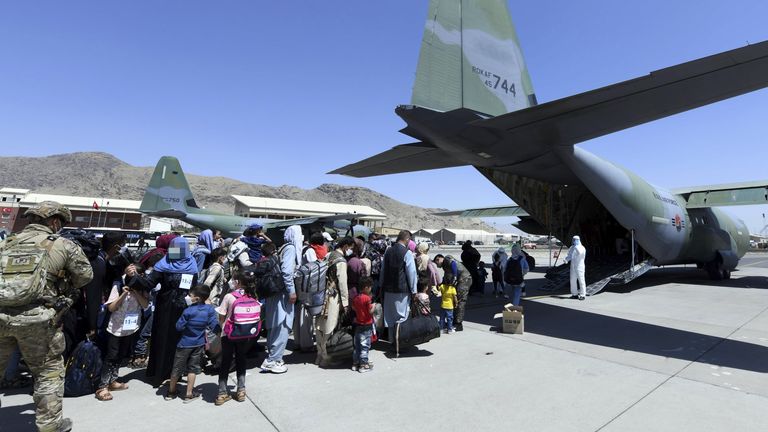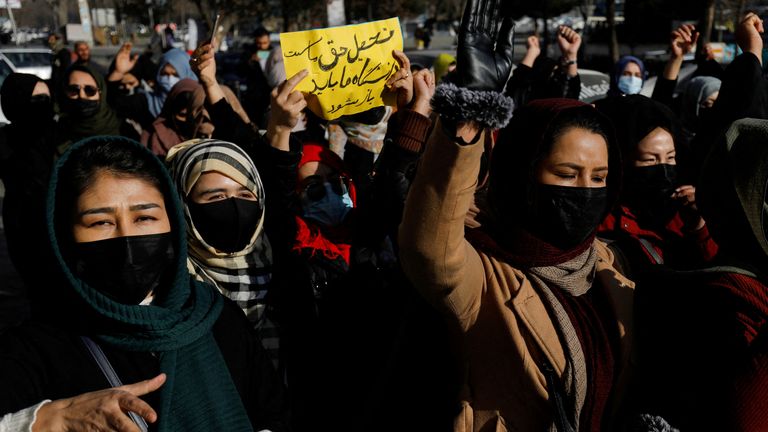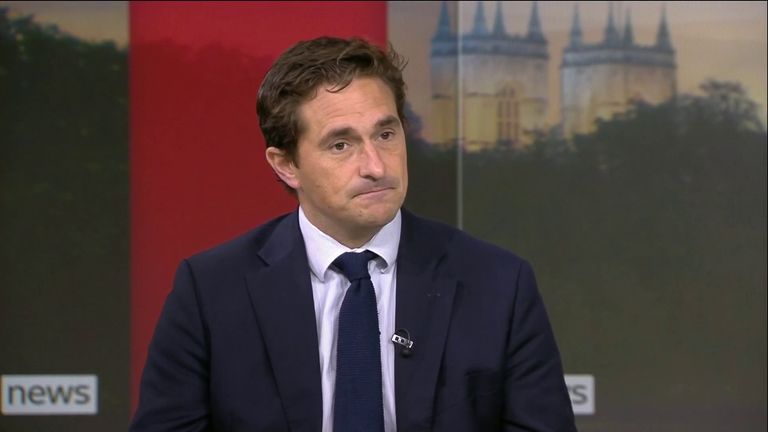Afghan resettlement scheme letting down families two years after Taliban takeover, think tank says | UK News
Many Afghan families have been let down by the UK government, a think tank has said, as it called for lessons to be learned after a number of failures.
More In Common, a think tank founded after the murder of Labour MP Jo Cox, recognised some success at resettling thousands of refugees following the Taliban’s takeover of Afghanistan two years ago today but said there had been failings in key areas such as housing and accommodation, funding and integration of Afghans into local communities.
Veterans minister Johnny Mercer has said he recognises that some Afghan refugees have had a “very difficult experience” and admitted that some things “could have been done differently”.
In 2021, the government promised a “significant cross-government effort”, nicknamed “Operation Warm Welcome”, to “ensure Afghans arriving in the UK receive the vital support they need to rebuild their lives, find work, pursue education and integrate into their local communities”.
While thousands have since moved into settled accommodation, many remain in hotels and were given a deadline by the government of the end of August to find alternative housing, prompting warnings of homelessness.
The More In Common report, published today, said the programme “has not lived up to its potential”, and added: “The British public’s generosity of spirit towards Afghan refugees has not been met by what has so far been delivered by local and national government.
“The result is that many Afghan families have been let down.”
More In Common detailed research conducted with a small group of refugees, and found “failures of communication with local authorities and the Home Office on housing, the stress and anxiety of trying to ‘find your own accommodation’, the repeated rejection of applications, and unsuitable offers of accommodation being made – either not taking into account job prospects or in areas hundreds of miles away”.
It cited an example of one refugee living in temporary so-called bridging accommodation in Bristol for almost a year being then offered permanent accommodation in Northern Ireland – which he rejected due to wanting to be near family in the city.
He said he had had 20 rental applications rejected “because I don’t have the background of renting a house in [the] UK”, and added that government financial support seemed to make no difference to landlords’ decisions.
More In Common said its survey of 132 Afghans in the UK suggested the majority prioritised housing, financial support and finding a job when asked what extra support they needed, and added that local authorities received the brunt of the criticism.
“Many refugees’ offers for housing and jobs fell through because local authorities were too slow to react and not agile enough in finding solutions to complex challenges,” the report said.
It added that local authorities “had no incentive to act quickly on finding permanent accommodation for Afghans – partly because the government funding model was too slow to give them the tools they needed, and partly because the Home Office was paying for temporary accommodation up until an Afghan refugee presents as homeless as which point the local authority would be liable”.
The think tank said future schemes must be clear about the appropriate types of bridging accommodation, and said there should be “clear expectations and responsibilities for moving into permanent accommodation”, with a “tighter timetable” for how long this arrangement should last.
It also said more support around education, employment, cultural awareness, and English language lessons should be provided to aid integration.
More In Common UK director Luke Tryl, said: “We must ensure that when it comes to future cohorts of Afghan arrivals, or those fleeing conflict and persecution more broadly, what is delivered by the government matches up with the welcoming generosity of spirit the public expect.”
Minister admits things ‘could have been done differently’
Veterans minister Johnny Mercer has admitted that the scheme could have been run better, telling the PA news agency: “Clearly, hotels are not long-term accommodation options for Afghans and their families. I mean, some of them have had a very, very difficult experience. I recognise that. I’ve visited a lot of them myself.
“It was never the intention (for them to stay in hotels). The reality is that we’ve had to deal with the situation as we found it.
“There’s been a longstanding challenge around housing in this country and that’s collided with the reality of a very quick collapse in Afghanistan. And we’ve ended up where we’ve ended up, with Afghan families in hotels for far too long. So, look, things could always have been done differently.”
Mr Mercer also said the end of August deadline for people to leave hotels had been “a controversial move” but said it was done “with compassion in mind and I think it’s proved its worth”.
He said 440 Afghans had been matched to homes in the past week “and I couldn’t have generated that momentum without putting that hard deadline in there”.
A government spokesperson said it continues to work “closely with local authorities and NGOs (non-governmental organisations) on hotel departures in order to speed up the resettlement of Afghans into settled accommodation”.
They added: “Over 10,500 Afghans so far have been supported out of bridging hotels and into long-term accommodation and we will continue to make offers of suitable housing, which we strongly encourage Afghan families to accept.”







